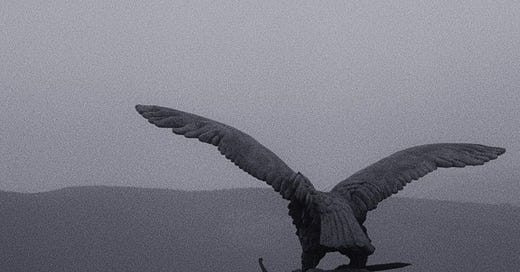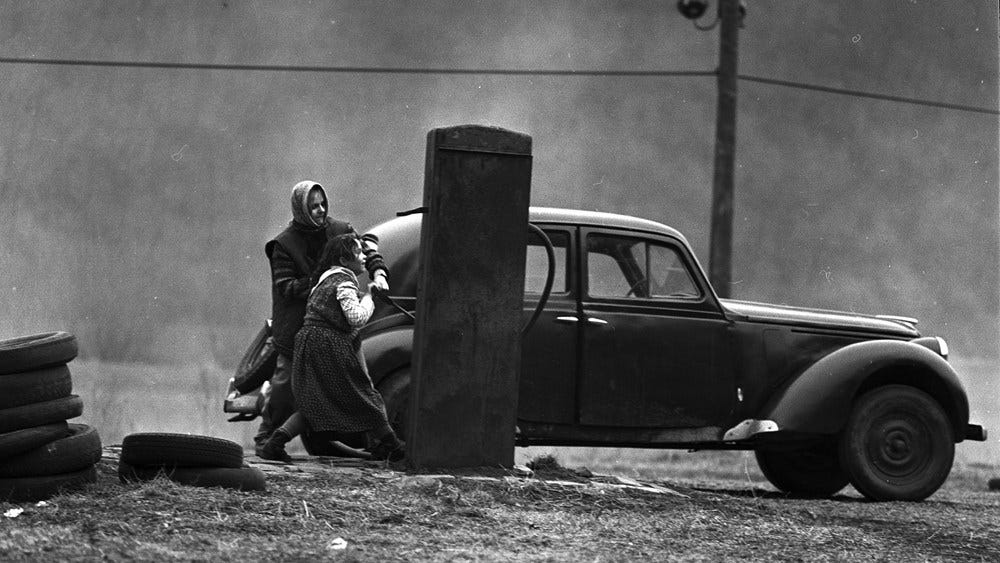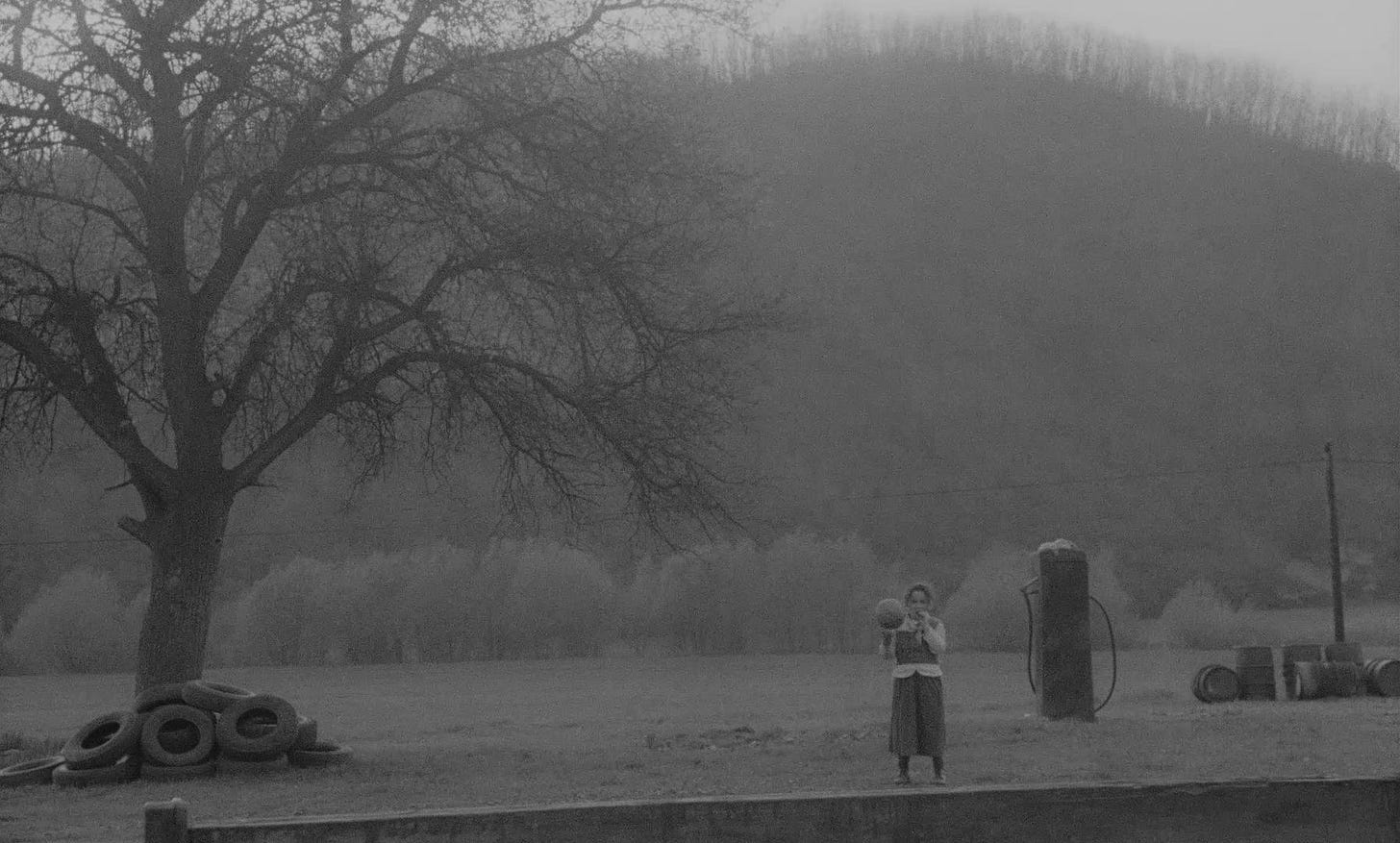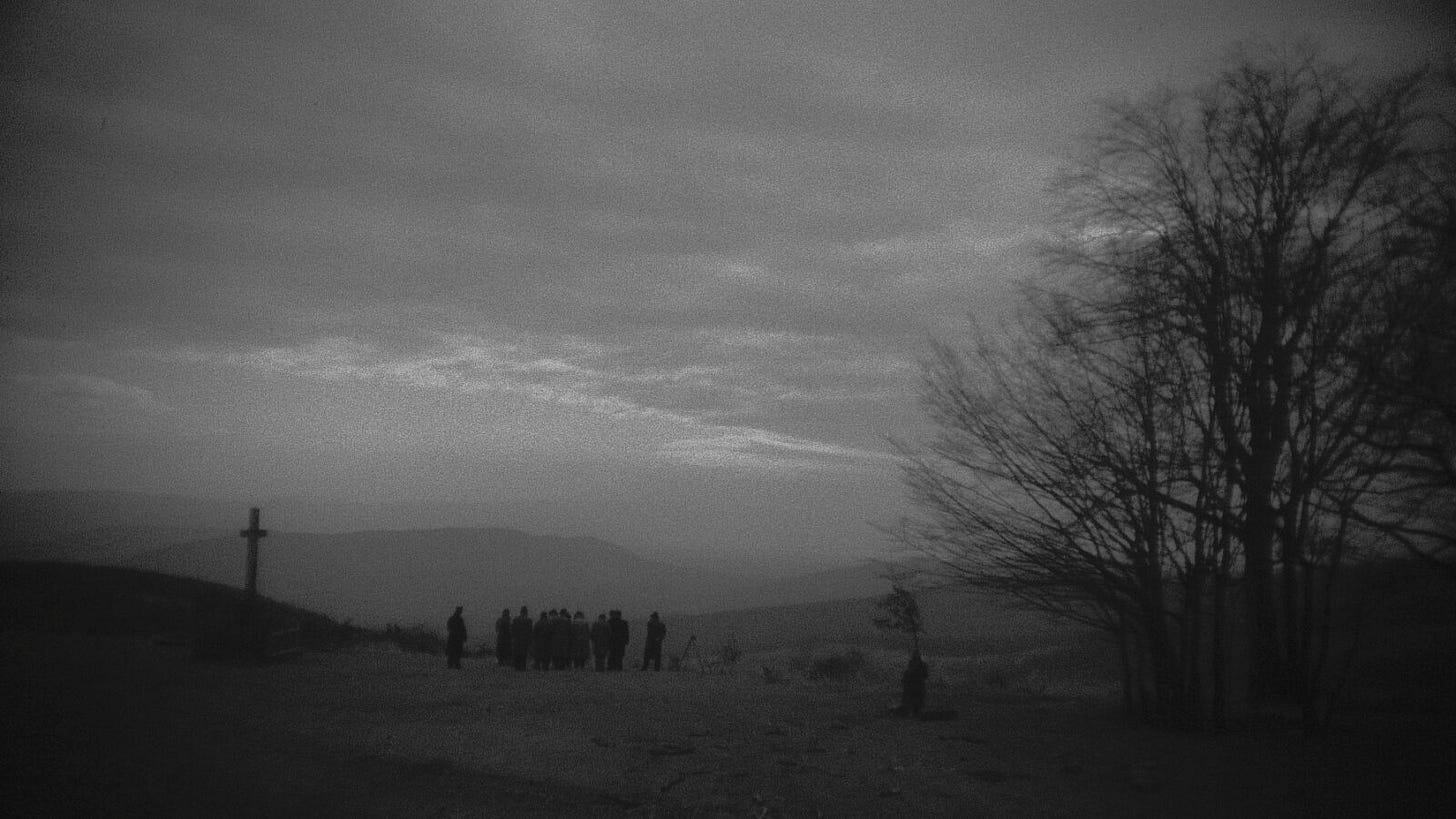Cinema Ghazals - featuring Bence Ádók - Twilight (Szürkület)
Gloomy Ghazals for a grim Hungarian thriller
*This is a special version of a series called Cinema Sonnets, where I invite fellow substack poets to pick a film, which we will both subsequently watch, meditate on, and use as inspiration for poetry. In this episode the Ghazal form will be used as opposed to the sonnet.
Ghazal
When I approached
from about the idea of creating sonnets for cinema, he was enthusiastic about the idea, but expressed that instead of the sonnet form he would instead prefer the Ghazal form.This form has had a great impact on Bence’s writing, so I agreed to meet his request and change the format. This was my first time writing a Ghazal.
Here’s how it works:
We will both watch a film (of Bence’s choosing)
Individually create a Ghazal after watching
Share our Ghazals with each other
And lastly, collaborate on a final Ghazal— writing alternating stanzas.
The goal of this experiment is to share a great cinematic experience, use cinema as a meditative tool for creating poetry, and also to collaborate — working on a poem together as well as separately, starting from the same base-concept.
Twilight
I’ve been reading Bence for a while, and given the evocative and often violent language of his poems, I expected him to pick a film that was fairly dark — and he didn’t disappoint.
Twilight, or Szürkület is a Hungarian crime film from 1990 directed by György Fehér. The movie’s about a homocide detective that invests the murder of a young girl in the forest. Once the only witness and presumed murder commits suicide the detective gradually becomes more obsessive in his hunt for the murderer.
The film is very gloomy and poetic. I definitely recognized many visuals and themes from Bence’s writing. It’s very clear the film has had a profound impact on him.
First Twilight Ghazal:
The Peddler by Rasmus Rosenkrantz The dark forest houses pain and murder tonight. Babies will scream, their caskets turn over tonight. A stone crow's looking over borders of green mist, it’ll lead astray a wandering peddler tonight. He brings with him soap, shoelaces and old kitchen knives, he'll be wielding razors like a barber tonight! Cruelty hides behind fog from burning windows; The cold conjurer shall venture further tonight. The cross shall blur horrific screams and repressed dreams— Will the Lord be but a faint observer tonight? No end in sight: it's raining suffering for days— Perhaps we'll still dare say a last prayer tonight? Murderous stones shatter weak glass and infant bones; The wind will witness an 8-year-old's murder tonight. The girl plays ball with the gray ghost of her sister; She fears everything but to surrender tonight. Cries drown the silent echo of buried babies— Who will be next to join the wanderer tonight? The giant's animals are evil's precursors; Only twilight's left for us to nurture tonight.
Second Twilight Ghazal:
Closing The Circle by Bence Ádók Closed circle, watch the static fuzz of skies to dissipate. Time leaks from steel blades, yours is moonrise to dissipate. An eight year old child's torn hair sways in empty branches, winds scythe these gaunt eyes, follow her cries, to dissipate Leather feet shuffle down eyeless stairwells, beyond, the remains of dew children metallize, to dissipate The stone cruciform marks the graveyard of what once was, days of ash, the circle only dies to dissipate Gardens of grief where promises, parasitic truths, and oaths uttered in stone tongues crystallize, to dissipate Cranial trees could only watch the light fade away, a giant sleeps there, feel God's gray eyes, to dissipate The barbed touch of the bramble bush cuts you in a dream, wake up marked, make the dream wound arise, to dissipate An elegy from the frozen marrow of the skies reveal bated breaths that fossilize, to dissipate Past the greyscaled vertebrae of bent leaves, light as choirs of blind children, our days died lengthwise, to dissipate This town exhales grief and mud, only one man remains to walk the circle, searching, clockwise, to dissipate A desolate car remains by the comatose rain, this iron ark outlives the sunrise, to dissipate When all has been heard, the end of the matter is this: Twilight lies terminal, beneath skies, to dissipate.
Third Twilight Ghazal:
Twilight's Excavation
by Bence Ádók (stanzas: 1, 3, 5, 7, 9 ,11, 13)
& Rasmus Rosenkrantz (Stanzas: 2, 4, 6 ,8, 10, 12, 14)
Stone bowls hold the rain of tears blind to light falling.
Moon's bones bloom tonight, lighter than a kite falling.
Evil grooms the evening moon for divine sorrow;
as hills surrender to shadows of night falling.
In the silver bowels of the fog there's a man
you cannot find amidst the grievous blight falling.
Wings of stone from petrified crows turn to marble
tombstones crumbling in the earth with sky's might falling.
Maimed stars deaf to the shadows in broken glass
jagged fruits of the manhunt, doused searchlight falling.
Singing skeletal sculptures commence composing
a necromantic requiem for life falling.
This is an excavation of breaths lost in soil;
the hills prate of death, their tones recondite, falling.
Shall screams of infancy resound eternally,
echoing the maternal tears that fight falling?
Call through the mists that nephilim leave lingering,
their trace buried by petals grey and white, falling.
The cross stands mute as sole witness to the slaughter—
bleak Christianity sees you’ll requite, falling.
There is a man in the woods, can you guess his face?
No, but he is in the air, out of sight falling.
The full moon turns its eye from the forest tonight,
crows’ cries crowd the sky, confined tears of plight falling.
Wraiths of hevel wait for the dead's revelation;
rains of cancer, a gray god's acolyte, falling.
The last rosary’s broken, cursed is the night,
Twilight shall forever be the sole light falling.Final Reflections:
Bence:
Having read the first entry of Cinema Sonnets where
and Rasmus collaborated on an Andrei Tarkovsky film, I went into a week's worth of thinking about my own favourite films, and how they had had an impact on me.Now, I have a specific taste in film which is very similar to my writing. Out of 57 films which I would consider perfect, I chose to write about an incredibly elusive and mysterious Hungarian crime thriller that is much more about the nature of stillness and silence rather than the act of a crime itself.
Twilight is a film that was very hard for me to actually watch, with it now being out on DVD, it made my life easier, but ever since I first watched it, it has stuck with me.
And as an admirer of the ghazal art form, having never truly written a ghazal that followed the ancient structure and included all formal elements, when Rasmus reached out, I knew that I had to create a ghazal with him. The ghazal, in my opinion is perfect for the collaboration, it allows both poets to simultaneously tap into transcendent images, without having to link any of the stanzas together.
As many of you know, Tonight is my favourite poem of all time, so having persuaded Rasmus to collaborate on a ghazal for one of my favourite films of all time, I pushed myself to bring you the absence, the stillness, the death, the finality and the meaninglesness of Twilight, a film that after 5 rewatches, still eludes me.
I would recommend, that everyone who aspires to write meaningful poetry that continues speaking to a reader after it has been read, to watch this film, which is available online, or DVD, if you are a collector of DVDs like myself.
As for the project, I am pleased to the fullest with what me and Rasmus produced. The challenge of this collaboration was to match the style of the film. Not aggressive on the surface, but violent, dark, brooding and alienating below the surface, this was the aim. And I think that these three poems do match that. Readers, prepare yourselves for a dark journey, thanks again to Rasmus for reaching out, I can't wait to see what other films are written about next!
Rasmus:
This project was quite challenging for me. Immediately I found myself out of my comfort zone, with having to write Ghazals — a form of poetry I wasn't very familiar with. Furthermore my collaborator Bence is a force of nature; the same day he locked his choice of film, he four hours later told me that he had a Ghazal ready, having sitten and done nothing but working tirelessly to produce something great. I decided to wait with reading Bence's poem until after I had seen the film myself as well.
Twilight isn't an easy movie to watch or approach. It is slow and gloomy, relying almost entirely on visual language — atmosphere that is. The movie is oddly unsettling, even when showing images that wouldn't normally inspire dread.
After watching the movie I somewhat organically managed to produce a Ghazal. I felt quite happy with my poem until I read Bence's Ghazal which was just masterful.
For our collaboration I knew I had to give it my all, dedicating extensive time and care to each stanza. Writing a joint Ghazal honestly worked brilliantly. With each stanza our seperate writing styles started melting into a shared unit, and I found myself writing in a way I didn't think I was capable of writing in.
A big thank you to
for participating and pushing me to my limits. I believe this project was very formative for both of us, and that the result reflects our shared development and growth.*Cover art and all media used in this post was taken from Twilight (Szürkület) from 1990 by György Fehér. Production company: Budapest Filmstúdió











I think this means another rewatch of the film. Happy reading everyone!
Loved the mixture of ghazal form with this film, and I'm completely stunned by the collaborative ghazal, brought out magnificent lines from both, and the repetitive form brings such a nice rhythm and contrast while mantaining cohesion. Really a testament to how effective an exercise this is to grow poetically!